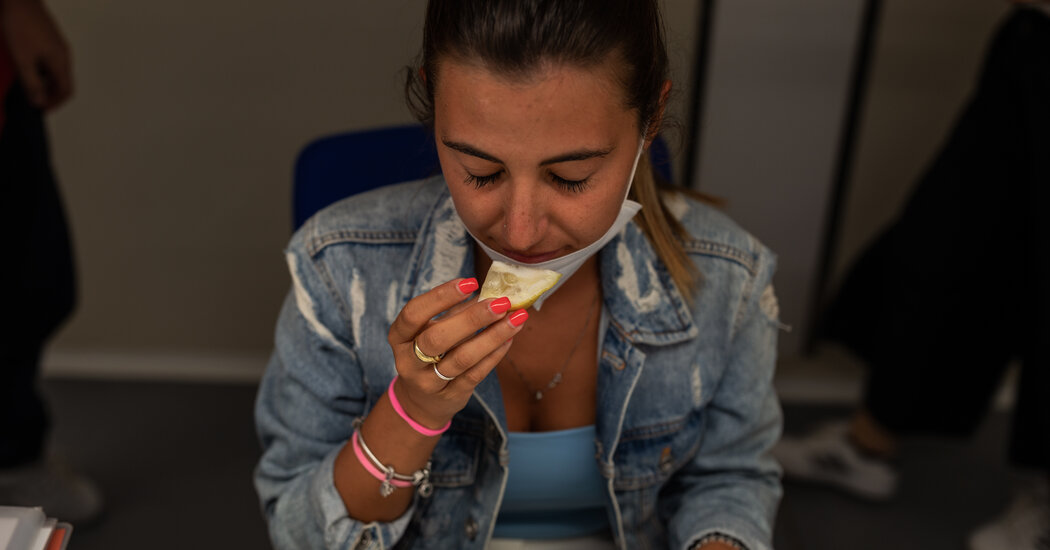
Few of Covid-19’s peculiarities have piqued as much interest as anosmia, the abrupt loss of smell that has become a well-known hallmark of the disease. Covid patients lose this sense even without a stuffy nose; the loss can make food taste like cardboard and coffee smell noxious, occasionally persisting after other symptoms have resolved.
Scientists are now beginning to unravel the biological mechanisms, which have been something of a mystery: The neurons that detect odors lack the receptors that the coronavirus uses to enter cells, prompting a long debate about whether they can be infected at all.
Insights gleaned from new research could shed new light on how the coronavirus might affect other types of brain cells, leading to conditions like “brain fog,” and possibly help explain the biological mechanisms behind long Covid — symptoms that linger for weeks or months after the initial infection.
The new work, along with earlier studies, settles the debate over whether the coronavirus infects the nerve cells that detect odors: It does not. But the virus does attack other supporting cells that line the nasal cavity, the researchers found.
The infected cells shed virus and die, while immune cells flood the region to fight the virus. The subsequent inflammation wreaks havoc on smell receptors, proteins on the surface of the nerve cells in the nose that detect and transmit information about odors.
The process alters the sophisticated organization of genes in those neurons, essentially short-circuiting them, the researchers reported.
Their paper significantly advances the understanding of how cells critical to the sense of smell are affected by the virus, despite the fact that they are not directly infected, said Dr. Sandeep Robert Datta, an associate professor of neurobiology at Harvard Medical School, who was not involved in the study.
“It’s clear that indirectly, if you affect the support cells in the nose, lots of bad things happen,” Dr. Datta said. “The inflammation in the adjacent cells triggers changes in the sensory neurons that prevent them from working properly.”
Indeed, many complications of Covid appear to be caused by the immune system’s friendly fire as it responds to infection by flooding the bloodstream with inflammatory proteins called cytokines, which can damage tissue and organs.
“This might be a general principle: that a lot of what the virus is doing to us is a consequence of its ability to generate inflammation,” Dr. Datta said.
The new study is based on research carried out at Zuckerman Institute and Irving Medical Center at Columbia University in New York; the New York University Grossman School of Medicine; the Icahn School of Medicine at Mount Sinai in New York; Baylor Genetics in Houston; and the School of Medicine at the University of California, Davis. The research was published online in Cell in early February.
The scientists examined golden hamsters and human tissue specimens from 23 patients who succumbed to Covid. After the hamsters were infected with the original coronavirus, scientists tracked the damage to their olfactory systems over time.
(How do you know a golden hamster has lost its sense of smell? You don’t feed it for several hours and then bury Cocoa Puffs in its bedding, said Benjamin tenOever, a professor of microbiology at NYU Langone Health and an author of the new research. Hamsters that can smell will find the cereal in seconds.)
The virus did not invade neurons, the researchers learned, only the cells that play supporting roles in the olfactory system. But that was enough to alter the function of the nearby neurons, leading to a loss of smell.
The Coronavirus Pandemic: Key Things to Know
Mask guidance. The Centers for Disease Control and Prevention released updated data that suggests 90 percent of the U.S. population are in a location with low or medium Covid-19 community levels and can now stop wearing masks.
The immune response altered the architecture of genes in the neurons, disrupting production of odor receptors, said Marianna Zazhytska, a postdoctoral fellow at the Zuckerman Institute and one of the paper’s first authors, along with a graduate student, Albana Kodra.
“It is not the virus itself causing all this reorganization — it’s the systemic inflammatory response,” Dr. Zazhytska said. “The nerve cells are not hosting the virus, but they are not doing what they did before.”
The ability of the olfactory receptors to send and receive messages is disrupted. But the neurons don’t die, and so the system can recover after the illness resolves.
Earlier work at the Zuckerman Institute showed that neurons that detect smells have complex genomic organizational structures that are essential to the creation of odor receptors, and the receptor genes communicate among themselves very intensively, said Stavros Lomvardas, one of the paper’s corresponding authors.
“We saw early on that upon infection, the genomic organization of these neurons changes completely — they’re unrecognizable compared to how they normally are,” Dr. Lomvardas said.
“There is a signal released from the infected cells that is received by the neurons that normally detect odors, and tells them to reorganize and stop expression of olfactory receptor genes,” he said.
He suggested this may represent an evolutionary adaptation that offers a form of antiviral resistance and whose main purpose may be to prevent the virus from entering the brain. “That was a relief for us,” he said. “That was one piece of good news.”




